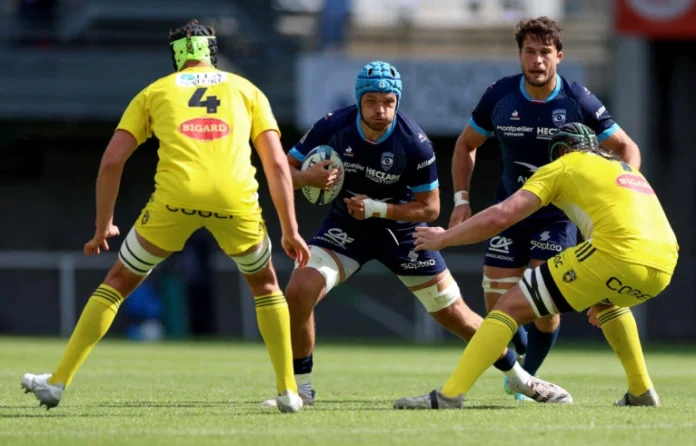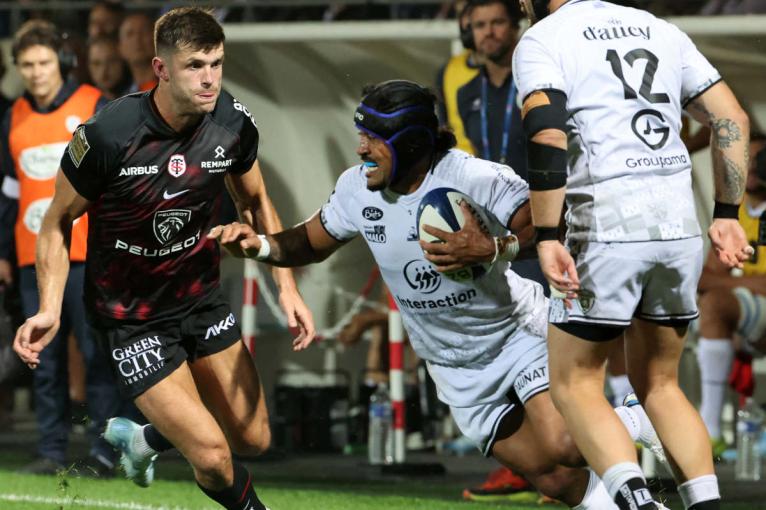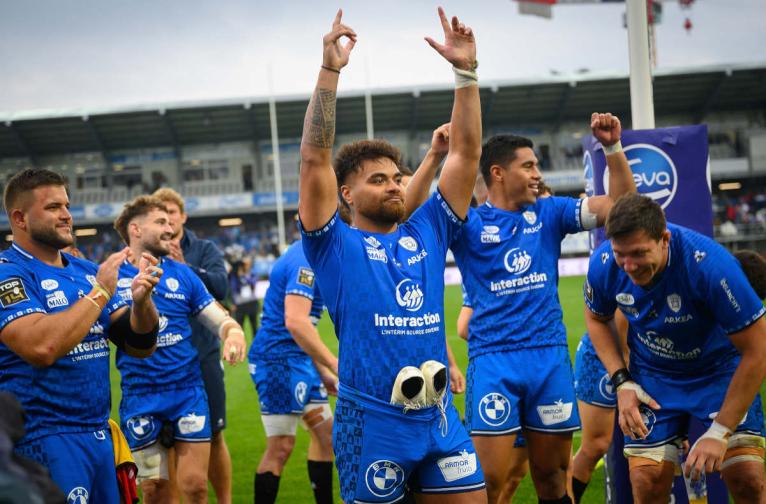
[ad_1]
Of all the Englishmen who moved across the Channel this year, none has made such an immediate impression in the Top 14 as Mako Vunipola. He’s played only three matches for Vannes but already he is approaching cult-hero status.
Not only did Vunipola score Vannes’ first try of the season in their opening match against Toulouse, but it was also their first five-pointer in the Top 14. The Brittany club – the first from the region to appear in the top-flight – won promotion last season and the England and Lions loosehead prop was their marquee signing in the summer.
Toulouse were too strong for Vannes, winning 43-18, but the one area where the defending champions struggled was the scrum. Twice Vunipola gave his opponent, the French international tighthead Dorian Aldegheri, a going over, winning penalties on both occasions. He also made life uncomfortable for the Stade Français front row a week later.
Une légende du rugby international pour écrire ce moment d’histoire ✊
Le premier essai de notre club en @top14rugby signé ???? ???????? 🙌#FiertéBretonne pic.twitter.com/rha2jwy0eC
— Rugby Club Vannes (@RugbyClubVannes) September 9, 2024
The elder Vunipola, named in Midi Olympique’s Top 14 Team of the Week for a second week running after helping Vannes to their first league win – 30-20 over Lyon – last Saturday, is looking like one of the best acquisitions of the summer.
Jonny Wilkinson and Nick Abendanon aside, the English players who have adapted best to French rugby have been forwards: Zach Mercer at Montpellier, Steffon Armitage, Joe El Abd and Andrew Sheridan at Toulon, Jack Willis at Toulouse, Carl Fearns at Lyon and Perry Freshwater at Perpignan.
It may be easier to make the transition for a forward. Steve Walsh, the fitness coach at Toulon during their glory days a decade ago, told me a couple of years ago that Mercer’s success at Montpellier hadn’t surprised him. “He fits in so well because the Top 14 is slightly slower [than the English Premiership] and also less structured and that suits Zach’s game,” explained Walsh, who has also worked extensively in the Premiership. “The skill level among the forwards is a little lower and so with his natural ability, and the speed with which he reads the game, Zach can really shine.”
Zach Mercer was named Top 14 Player of the Year after helping Montpellier to the title in his first year in France (Photo Pascal Guyot/AFP via Getty Images)
If the less structured game in France suits forwards, it perhaps explains why English three-quarters often find it harder to adapt. In his first three games for Racing 92, Owen Farrell has made little impact.
Abendanon was an exception. He won the Top 14 title with Clermont in 2017 before spending the last three seasons of his career at Vannes. When the former England full-back signed for the club in the summer of 2020 they were in the ProD2. “I knew they were very ambitious but more a middle-table team than one competing for the title,” he told me in an interview for RugbyPass in May 2021. “But it’s definitely exceeded my expectations..it’s been a breath of fresh air getting involved with a new club and a new competition.”
Vannes’ opening match against Toulouse was prefaced by a stirring rendition of Bro Gozh Ma Zadou, the Breton anthem sung to the same tune as the national anthem of Wales, Hen Wlad Fy Nhadau.
In Abendanon’s first season Vannes reached the play-off semi-finals of the ProD2, losing 34-33 to Biarritz. It was, he reflected, a blessing in disguise. “The infrastructure is not in place at the moment,” he said. “We’ve got planning permission for a new training centre and that looks great but it will take a year to build. We are going in the right direction. We have a great fan base and we are one of the few ProD2 clubs to make a profit. But obviously the Top 14 is a different beast to the ProD2.’
The new training centre opened in 2022 and the following year Vannes again lost in the semi-final play-offs, this time to Oyonnax, who won promotion to the Top 14 for the 2023-24 season but are now back in the ProD2.
Can Vannes avoid a similar fate? They lost their opening match to Toulouse but performed creditably against Europe’s best club. It was an evening that none of the 12,000 spectators will forget in a hurry, the match prefaced by a stirring rendition of Bro Gozh Ma Zadou, the Breton anthem sung to the same tune as the national anthem of Wales, Hen Wlad Fy Nhadau.
 Vannes performed creditably against champions Toulouse before earning a losing bonus point at Stade Francais (Photo Fred Tanneau/AFP via Getty Images)
Vannes performed creditably against champions Toulouse before earning a losing bonus point at Stade Francais (Photo Fred Tanneau/AFP via Getty Images)
The man responsible above all others for the evolution of Vannes is the club president, a local called Olivier Cloarec, who became a partner in 2006. By his own admission, “I didn’t like rugby at all, I didn’t understand the sport”.
Football was his passion outside business, but he spotted the potential in Vannes (then in Federale 1, the third tier of French rugby) and in 2016 Cloarec became president.
I’m certain that if we had a 15,000 or 17,000-seat stadium, we’d be playing to full houses every game.
His ambition was to have Vannes playing in the Top 14 by 2023, so he was only one year behind schedule. Now they’re here, he wants to consolidate their status as a top-flight club, on and off the pitch. Vunipola was one of several signings during the summer and there are plans to increase the stadium’s capacity from its current 12,000 seats.
‘We need 15,000 seats to compete in this championship,’ explained Cloarec in a recent interview with local newspaper Le Télégramme. “We need between 3,000 and 3,500 for hospitality…I’m certain that if we had a 15,000 or 17,000-seat stadium, we’d be playing to full houses every game.”
There have been rumours that Vannes will play a handful of home matches at some of the football stadiums in Brittany but that would detract from the raucous atmosphere generated within the Stade de la Rabine, only a short walk from the heart of Vannes, which is its old harbour with numerous bars and bistros on the quayside.
 Vannes’ players celebrated their first Top 14 win last Saturday against Lyon (Photo Loic Venance/ AFP via Getty Images)
Vannes’ players celebrated their first Top 14 win last Saturday against Lyon (Photo Loic Venance/ AFP via Getty Images)
But money is an issue for the club. Vannes’ budget for the season is €19m, the smallest of the Top 14 clubs and half of what Toulouse, Stade Francais and La Rochelle have at their disposal.
But Cloarec takes heart from events 100 miles up the coast in Brest. A year ago, the town’s football club had never finished higher than eighth in Ligue 1, the French top flight. They finished third last season and are now in the Champions League with upcoming fixtures against Barcelona and Real Madrid. “They are great friends of mine, and I’m so happy for them,” said Cloarec. “We talk a lot about the project, the identity, the territory…a model that can be transposed to rugby? Why not?”
The days when Brittany was best known for cider and crêpes are long gone. It’s becoming a sporting hot spot.
Cloarec might also look directly north across the Channel for inspiration. In 2009-10 Exeter won promotion to the Premiership and 10 years later the club won the title and the Champions Cup in the same season.
As Cloarec said, it’s all about creating an identity that draws in players, fans and sponsors. It helps if you’re the only club for miles around, which is the case for Exeter and Vannes, whose nearest rival is La Rochelle, 150 miles south.
Real Madrid are coming to Brittany in January, which will probably bring the region to a standstill. The days when the peninsula was best known for cider and crêpes are long gone. It’s becoming a sporting hot spot.
[ad_2]
Copyright for syndicated content belongs to the linked Source link


